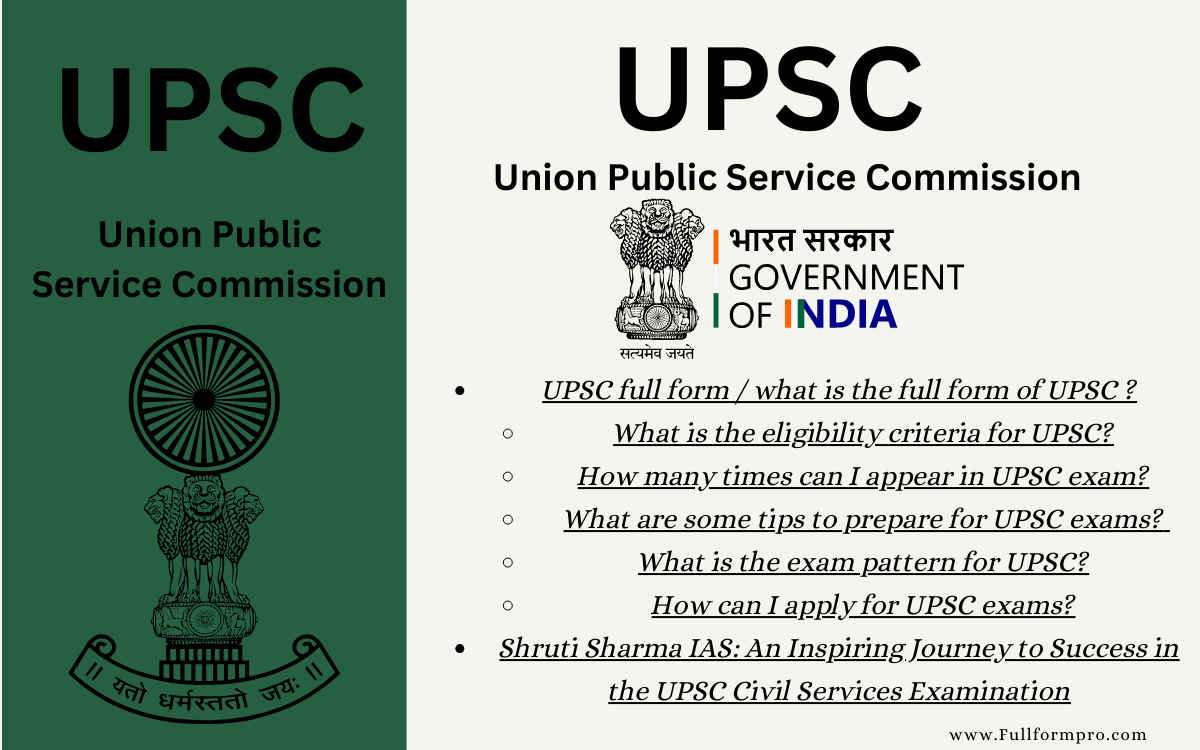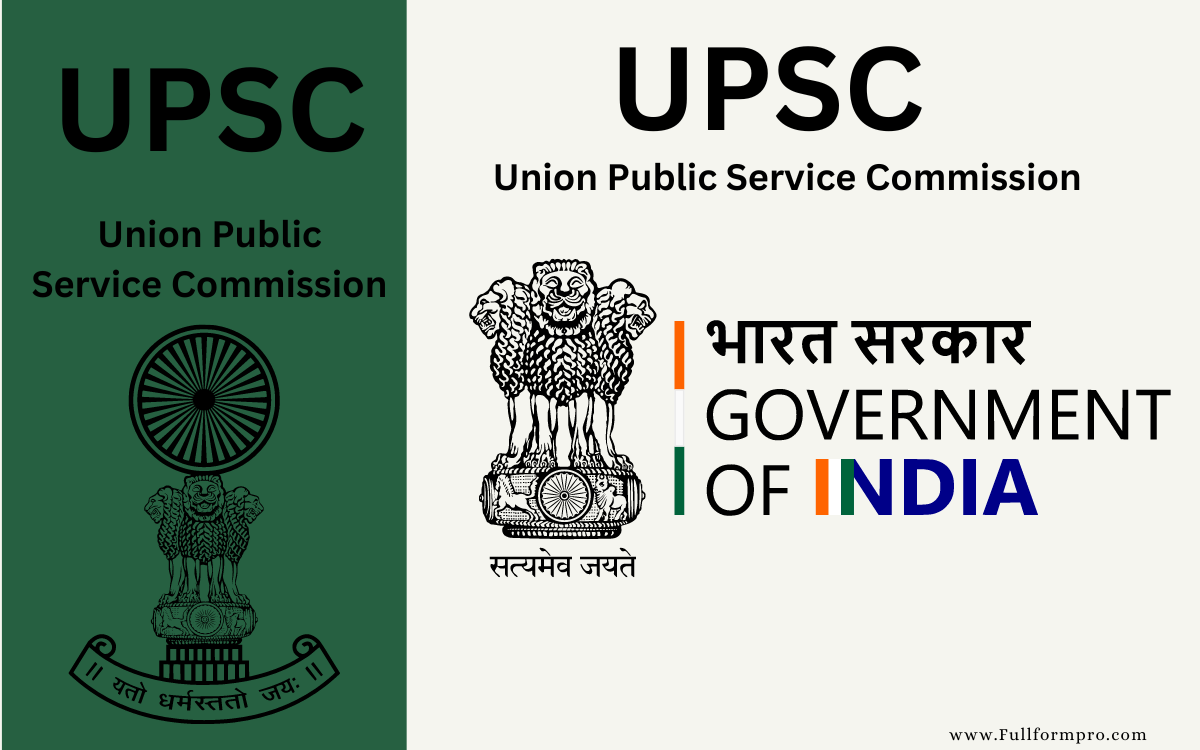UPSC: Understanding the Full Form and its Significance
UPSC abbreviation
UPSC definition & The full form of UPSC is Union Public Service Commission. It is a premier agency responsible for conducting recruitment exams for various positions in the Indian government. One of the most well-known exams conducted by UPSC is the Civil Services Examination (CSE), commonly known as the IAS exam.

What is the eligibility criteria for UPSC? / UPSC details
What does UPSC stand for – UPSC is Union Public Service Commission
The UPSC eligibility criteria for the Civil Services Examination (CSE) encompass several factors:
Nationality:
- You must be an Indian citizen.
Age Limit:
- The minimum age is 21 years as of August 1st of the exam year.
- The upper age limit is generally 32 years for the General category and Economically Weaker Section (EWS).
- There are age relaxations for candidates belonging to Scheduled Castes (SC), Scheduled Tribes (ST), Other Backward Classes (OBC), and Persons with Disabilities (PwBD).
Educational Qualification:
UPSC meaning- UPSC full name is Union Public Service Commission
- You must possess a Bachelor’s degree from a recognized university in India or an equivalent qualification.
- Candidates in their final year of graduation appearing for their exams can also apply.
- However, they must produce proof of passing the exam while applying for the UPSC Mains.
Number of Attempts:
- The number of attempts for the UPSC exam varies based on your age and category.
- Generally, candidates from the General category and EWS have six attempts.
- There are more attempts allowed for reserved categories like SC/ST and PwBD.
Additional Points:
- You can find the official notification for the UPSC CSE with the latest eligibility details on the UPSC website.
- There might be other restrictions on applying depending on your previous service or employment under the Central/State Government.
For a deeper dive into the eligibility criteria, you can refer to resources from coaching institutes like Byju’s IAS, KGS IAS, Dhrishti IAS
How many times can I appear in UPSC exam?
The number of attempts you get for the UPSC exam depends on your category:
- General Category & Economically Weaker Section (EWS): 6 attempts till 32 years of age
- Other Backward Classes (OBC): 9 attempts till 35 years of age
- Scheduled Castes (SC)/Scheduled Tribes (ST) & Persons with Disabilities (PwBD): Unlimited attempts till their respective upper age limits (37 years for SC/ST and as per their category for PwBD)
What are some tips to prepare for UPSC exams?
Cracking the UPSC Civil Services Exam (CSE) requires a well-structured approach and dedication. Here are some tips to help you prepare effectively:
Laying the Foundation:
- Understand the Exam: Familiarize yourself with the UPSC CSE format, syllabus, and eligibility criteria. This will guide your preparation strategy.
- Build a Strong Base: Start with NCERT books to establish a strong foundation in core subjects like History, Geography, Polity, Economics, and Science & Technology.
Strategic Planning & Resources:
- Create a Study Plan: Develop a well-organized schedule that allocates dedicated time for each subject. Be realistic and factor in revision.
- Choose the Right Material: NCERTs are a great starting point. Supplement them with standard reference books and current affairs sources suggested by toppers or coaching institutes.
- Optional Subject Selection: Strategically choose an optional subject you’re comfortable with and can excel in. It can significantly boost your score.
Enhancing Knowledge & Skills:
- Stay Updated on Current Affairs: Regularly read newspapers like The Hindu or The Indian Express and magazines like Yojana to stay abreast of current events.
- Practice Answer Writing: Develop the ability to write clear, concise, and well-structured answers as per UPSC’s requirements. Practice daily answer writing for Mains.
- Solve Previous Years’ Papers & Mock Tests: Regularly solve past UPSC question papers to understand the exam pattern and marking scheme. Take mock tests to identify your strengths, weaknesses, and improve time management.
Maintaining Focus & Wellbeing:
- Revision is Key: Regularly revise completed topics to retain information and enhance understanding.
- Stay Motivated: The UPSC journey can be long. Surround yourself with positive influences and maintain a healthy study-life balance.
- Take Care of Yourself: Ensure adequate sleep, eat nutritious food, and exercise to stay physically and mentally fit for the demanding preparation.
Additional Tips:
- You can explore online resources or coaching institutes for additional guidance and support.
- Group discussions with fellow UPSC aspirants can be helpful for knowledge sharing and motivation.
What is the exam pattern for UPSC?
The UPSC Civil Services Exam (CSE) follows a three-stage pattern:
Stage 1: Preliminary Examination (CSAT)
- Objective Type: This stage consists of two objective-type papers with a multiple-choice question format.
- Papers:
- General Studies Paper I (GS Paper I): Tests your knowledge on various subjects like History, Geography, Polity, Science & Technology, Economy, Social Issues, and Environment. (100 questions, 2 marks each, negative marking)
- CSAT Paper II (General Studies Paper II): Assesses your analytical abilities, logical reasoning, decision-making, and problem-solving skills. (80 questions, 2.5 marks each, negative marking)
- Qualifying Nature: This stage is a screening test to shortlist candidates for the Mains exam. Marks obtained here are not included in the final merit list.
- Cut-Off: UPSC declares a cut-off based on the difficulty level of the exam. Only candidates securing the minimum marks in each paper and clearing the overall cut-off proceed to the Mains.
Stage 2: Mains Examination
- Descriptive Type: This stage comprises nine written papers, all subjective and essay-based. Each paper is of 250 marks and lasts 3 hours.
- Papers:
- Compulsory Language Paper (Paper A): You choose a language you’re comfortable with to write an essay and comprehension passage. (Qualifying nature, minimum 25% marks)
- English Language Paper (Paper B): Tests your English writing skills through essay, comprehension, and precis writing. (Qualifying nature, minimum 25% marks)
- Seven Subject Papers (Paper I to VII): Cover subjects like Essay, Indian History, Indian Constitution & Other Laws, Governance & Administration, World History & Geography, Sociology, Public Administration, General Science, Optional Subject (chosen by you)
- Evaluation: Mains marks are crucial for merit ranking and selection for the interview.
Stage 3: Personality Test/Interview
- Assessment: This stage assesses your personality, suitability for the civil service, and potential as an administrator.
- Marks: The interview carries 275 marks and is combined with your Mains marks to determine your final ranking.
Here are some resources for the UPSC exam pattern in detail:
- UPSC official website (https://upsc.gov.in/exams-related-info/exam-notification)
- Byju’s – UPSC Exam Pattern https://byjus.com/free-ias-prep/upsc-exam/
- Testbook – UPSC Exam Pattern https://testbook.com/upsc-civil-services
How can I apply for UPSC exams?
The application process for UPSC exams happens entirely online on the UPSC website: https://upsconline.nic.in/. Here’s a breakdown of the general steps:
-
Notification and Dates: Keep an eye out for the official notification for the specific UPSC exam you’re interested in. This notification will be published on the UPSC website and will contain crucial details like application dates, exam pattern, and syllabus.
-
Registration: During the application window, visit the UPSC online portal (https://upsconline.nic.in/) and register yourself. You’ll create a profile and receive a Registration ID (RID) for future reference.
-
Application Form Filling: There are usually two parts to the application form:
- Part I: Fill in basic details like your name, educational qualifications, category, etc.
- Part II: This might involve uploading scanned copies of your photograph, signature, and photo ID, selecting your exam center, and paying the application fee (if applicable).
-
Fee Payment: You may need to pay an application fee electronically through the portal if you don’t belong to an exempt category.
-
Submission: Once you’ve completed both parts of the application and reviewed everything, submit the form online. Make sure to take a printout or screenshot of the confirmation page for your records.
Important Reminders:
- Strictly adhere to the application deadlines mentioned in the UPSC notification. Late applications will not be accepted.
- Carefully read the instructions provided on the UPSC website while filling out the application form.
- Ensure you have scanned copies of the required documents (photograph, signature, ID) in the specified format and size before applying.
- Double-check all your information before submitting the application to avoid errors.
Here are some additional resources that might be helpful:
UPSC complete form is Union Public Service Commission
- UPSC’s FAQ on filling online applications: https://upsc.gov.in/apply-online
